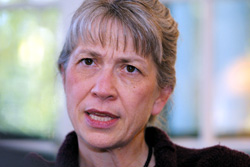Power, Insight, and Deception

by Doug Hubley
In 1991, Elaine Tuttle Hansen was called out of class at Haverford College with the news that debris from an aircraft collision had killed two children during recess at daughter Emma’s elementary school.
Confronting the possibility that one of the young victims was Emma, “I think I aged about 10 years on this 15-minute drive to the school,” Hansen says. Emma was fine — but the incident charged her mother’s academic work.
At the time, Hansen was examining the intersection between the literary theme of the childless mother and the main currents of feminist thinking, which called into question the relationship between childbearing and feminine identity. Hansen looked at the writings of seven authors, including Alice Walker, Louise Erdrich, Marge Piercy, and Margaret Atwood. The resulting book, Mother without Child: Contemporary Fiction and the Crisis of Motherhood (University of California Press, 1997), argues that fiction about or narrated by mothers who have had their children taken away has painted concepts of motherhood that are less static and less divisive than some feminist theoretists’.
“The head-on approach to the question [of how motherhood relates to womanhood] has not gotten us very far, because there’s an impasse, right?” Hansen says. “Women want to have it all — they want to be mothers but they want to be ‘people’ — and those things aren’t easy to accommodate.”
In her previous book, Hansen looked at the way women were depicted not by several authors but just one. Chaucer and the Fictions of Gender (University of California Press, 1992) was a response to questions raised when reading and teaching Chaucer in the late 20th century. What does a male author tell us about the history of women, and how does a woman reader understand the female characters he depicts?
Fictions of Gender suggested a whole new interpretation of Chaucer’s women, upsetting the longstanding view that Chaucer was an anachronistically tolerant friend to women. Instead, she argued that Chaucer used his complex portraits of women to work out notions of masculinity, specifically his fears about the femininization of men.
Hansen started down this literary path in the late 1960s, when relatively few people were questioning portrayals of women. (She strayed with her first book, The Solomon Complex: Reading Wisdom in Old English Poetry [University of Toronto Press, 1988], which offers an approach to interpreting the millennium-old riddles, proverbs, and aphorisms called “wisdom literature.”) Jane Austen, the subject of Hansen’s senior honors thesis at Mount Holyoke, opened her eyes to “ways in which a female author, so ahead of her time, is examining issues of gender and power.”
What interested her was Austen’s irony, the ability (which Austen shares with Chaucer) to “exploit the fundamental, intrinsic ambiguity of language” to convey one view of women in society while seeming to endorse quite a different one.